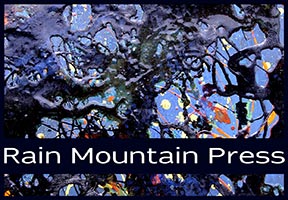

My Father's Window
by Maya Mary Hebert
Rain
The rain is all that needs to be said
The night my father asked me,
Who are you?
On the road to the nursing home, I survey the last of red maple and amber oak leaves of Tarrytown holding on until the next wind takes them down. The cab driver is silent but present, and I am glad for his company, for the company of a man driving, still connected to the outside world. We pass the reservoir that holds the town water, and from the speeding cab I catch a glimpse of the stark reflection of several already bare trees. I enjoy the swing around the lake, despite the repetition of my journey, once or twice a month for the past three years, and the specter of the man at its end who doesn't know I'm coming, and may not know who I am or the day or the month, despite the unmistakable November grey of the sky.
Off the elevator I nearly run into a tower of perfectly stacked pink lunch trays and know, despite the unusually long cab ride from the station, I am just in time. The man who is my father is asleep and bibbed, alone at the end of the flesh colored table in the room of tables where others sit, eyes vacant in various stages of waiting for the food to come. I wonder where his tablemates are, if someone has died or been taken elsewhere. As I touch his shoulder to wake him, I wonder if he will remember it's been six weeks, if he will scold me. Instead, he comes the closest ever to saying he is glad to see me.
I'm glad somebody came today.
He is calm, subdued. But his calmness does not reassure me. I know it is partly the drugs, the Haladol speaking, and partly that he is touching the shores of surrender. His eyes are glassy and slow. I notice too the sweatshirt with stains on its blue and grey blocks is the same one he wore the last time I was here. I picture the nice sweaters that fill up his closet, that I and my sisters and his grandchildren have bought to comfort him, especially on a cold day as this. But after traveling for over two hours, I choose not to corner a nurse and complain. Instead I wheel him quickly out of the somber room, past the tower of pink trays, and take the elevator to the first floor cafe where there is light and a view of the trees.
I wheel my father to the booth farthest from the smokers with their sunken cheeks in varying shades of pink and grey. The table has splatters of dried paint on it, which I first think are crumbs and try to wipe off. I have forgotten to pack the place mats. Lunch is always easier if the table has pieces of home on it. I hope there are nice individual paper towels in the bathroom, but there is only the rough recycled kind on the long roll. I hope they will tear into neat squares, but instead, they rip all at odd angles.
I place his plate of meatloaf in the microwave with its brownish green stains, hit three minutes and go back to the table where my father sits motionless, looking smaller and grayer in the harsh cafe light. His shoulders, which are large for his size, are hunched, his usually defiant eyes cast downward. My blood quickens for this look I have seen before, but not on him -- on the faces familiar but nameless in the halls that line his ward.
I spread out the food I have brought from Brooklyn, telling him the meatloaf is from a Polish deli and has pork in it. Somehow I think this will please him. My mind quickly connects to his telling of growing up on their tiny Eastchester farm; how a pig was the cleanest animal, cleaner than a chicken, and how they would eat every part of it, even the feet and the knuckles. I try to imagine him as a young boy, scruffy from all the work he had described from his childhood. There are no photos of that time, the earliest being from around 1928 shows him standing lean and handsome, with worn shoes in front of a war bonds’ poster.